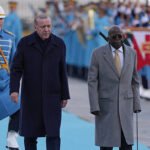By – Lawal Sale
The Two Sessions (Lianghui) of China’s 14th National People’s Congress (NPC) and the National Committee of the Chinese People’s Political Consultative Conference began in Beijing on March 6 at the Great Hall of the People. It is expected to last for a week.
President Xi Jinping and other Chinese leaders attended the opening of the meeting along with Premier Li Qiang, who delivered a Government Work Report at the meeting.
As has been the tradition in such meetings, reports will be reviewed from the State Council on the implementation of the 2023 Plan for National Economic and Social Development as well as the 2024 draft Plan for National Economic and Social Development.
The lawmakers will also review report from the State Council on the execution of the central and local budgets for 2023, as well as the draft for the central and local budgets for 2024.
Among the key takeaways at this year’s legislative meeting at the 2nd session of the 14th NPC will be: GDP growth of 5%, creation of 12 million new urban jobs, CPI increase of around 3%, grain harvest of about 650 million metric tonnes and a cut of around 2.5% in energy intensity.
Amongst other activities on the sideline of the Two-Session 2024 Meeting so far has been the interactive session with the Press by the Chinese Foreign Minister, Wang Yi, who is also a member of the Political Bureau of the CPC Central Committee.
At the Press briefing, Mr. Wang Yi shed light on the raging Gaza conflict and said categorically that the Palestinian people indeed deserved justice and that there was need for full implementation of the two-state solution to the crisis, as the only way to break the vicious cycle of Palestinian-Israeli conflicts. He reiterated that China supported Palestine’s full membership of the United Nations, while calling for a more broad-based, authoritative and effective international peace conference on the Gaza conflict.
Mr. Wang stressed that for world’s stability, an equal multi-polar world that translates to equal rights, opportunities and rules for every nation; is imperative, adding that “an orderly multi-polar world means that all should observe the purposes and principles of the U.N Charter.”
He expatiated on all three principles proposed by President Xi Jinping for a viable China-US relations, wherein “mutual respect is the pre-condition, peaceful co-existence is the baseline, and win-win cooperation is the goal”, adding that “if the U.S is obsessed with suppressing China, it will harm itself”.
On ‘certain powers’ that monopolize international efforts, Mr. Wang warned that countries should not be categorized according to their ‘strength’, stressing that ‘those with bigger fists’ should not have the final say on matters of global concerns. Such, he warned, is unacceptable as certain countries cannot be at the table while some others can only be on the menu.
Mr. Wang Yi further outlined the strategic importance of China-Russia relations, disclosing that the two historical allies and neighbours have forged a new paradigm of ‘Major-Country’ relations that differ entirely from the obsolete Cold War approach, non-alliance and non-confrontational, which all do not target any third party. He maintained that the growing relationship is a strategic choice by the two sides, which is wholly based on the fundamental interests of the two peoples.
On China-Africa relations, the Chinese Foreign Minister said that a new meeting of the Forum on China-Africa Cooperation (FOCAC) will be held in Autumn where Chinese and African leaders will discuss future developments and cooperation and hold in-depth exchanges on governance experience.
He added that China will continue to stand firmly with the African brothers and support an Africa that is truly independent ‘in thinking and ideas’, assuring them that China will assist in building capacity for self-driven development and support for faster modernization of the continent.
Perceptive analysts note that currently, China maintains diplomatic ties with about 53 African countries – all on the basis of win-win cooperation for common development.
(Sale, a Global Affairs Analyst writes from Abuja, Nigeria). lawalsale@mail.ru










